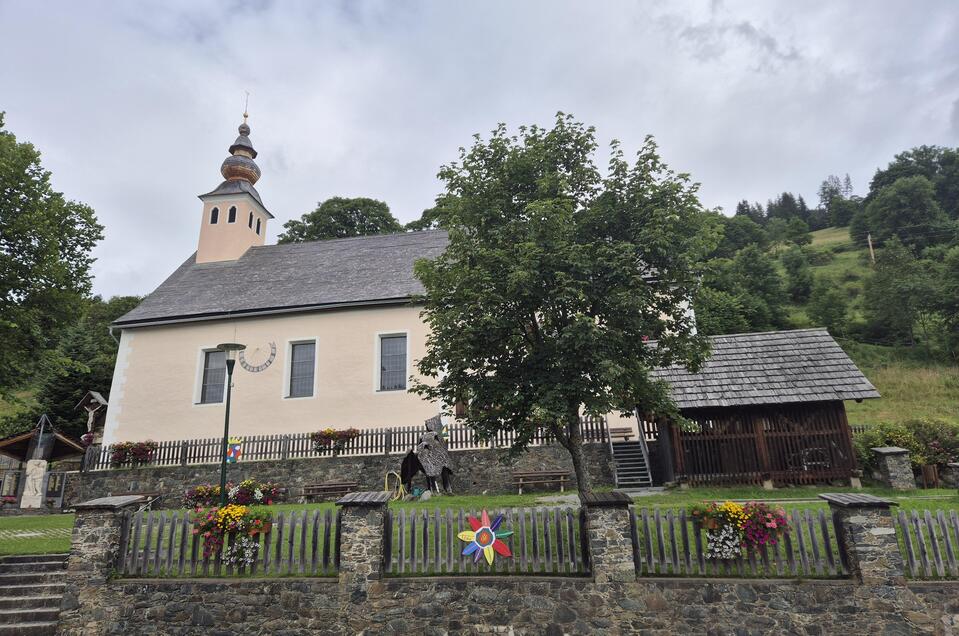Parish church Krakauebene
KrakauThe parish church in Kraków plain is dedicated to St. Ulrich. In the course of the 19th century the following items were purchased for the church: various images of saints, a confessional, a high altar in romantic style, an organ with six registers. Cracow plain was raised to a parish in 1892.
The inhabitants of the high valley of the Krakow had belonged to the parish of Ranten since its establishment in the first half of the 12th century. Apart from the Krakow valley, the parish territory included the Ranten valley with the church village Ranten and Schöder with the surrounding settlement areas. Only Ranten, Schöder and Krakaudorf have a closed settlement core, otherwise they are scattered settlements. The catchment area of the parish was so large that the person living farthest from Ranten had to walk 4 hours to the parish church.
In the later daughter churches St. Oswald in Krakaudorf and St. Ulrich am Hollerberg mass was only said every second or third Sunday until the 17th century. These churches had neither baptismal nor burial rights. Already around the middle of the 18th century, Maria Theresa had asked the bishops to work out plans how the religious needs of the population in the scattered settlements of the alpine valleys could be better met through the re-parishization or new establishment of parishes or localities. Concrete figures about the inhabitants of the "Gräben" were only available since the soul census of 1754. Even if these figures are not completely reliable, the number of 3833 souls given for the parish of Ranten can be assumed to be accurate.
In 1760 Krakaudorf was established as an independent vicariate. The vicar of Krakaudorf was responsible for the pastoral care of the population of the entire Krakow High Valley. There were about 1500 souls. The services were held mainly in the church of Krakaudorf. About 600 to 700 inhabitants of the scattered settlements in the westernmost part of the valley still had to walk 2 to 3 hours to church. The parish regulation decree of Emperor Joseph II from 1785 stipulated the establishment of a parish in "the area shadow" for this part of the valley's population. Apart from the present territory of the parish of Krakauhintermühlen, parts of the territory of the parish of Schatten were also to be served from the new parish. However, the start of construction of a church was delayed. Thus, at the beginning of 1787, the farmers of the remote settlements of Figler, Moos, Schatten, Klausen and Ebene asked the bishop and the district office to either allow church services to be held again in the old church of St. Ulrich on Hollerberg or to agree to a new church being built on a well-situated site.
Since the old church was described to the authorities as in danger of collapse, secular authorities and also the Bishop of Leoben agreed to the construction of a new church. The place where the new church, the parsonage and the school were to be built was now determined on the sunny side of the valley. In the Josephinian cadastre it is registered as belonging to the Pux dominion - Karl im Bach. The funds for the purchase of the land came from the population and the patronage of the school to be established at the same time. The construction was started in 1790 according to the plans of J. Hillebrandt, and in 1791 it was completed so far that the portatile and altar could be transferred from the old Ulrich Church. After completion of the rectory in 1793, the dean Leopold Hösse beneficed the church. At the same time the transfer of the bell from 1500 from the old church seems to have taken place. Pastoral equipment came to the new local curacy through donations, the financial resources were exhausted by land purchase and construction. In the course of the 19th century the following items were purchased for the church: various holy images, a confessional, a high altar in the Romantic style, an organ with six stops.Krakauebene was elevated to a parish in 1892. The first definitive parish priest was Alois Schober, who was in charge of the parish from 1919. In 1935, the first high altar, which was probably rebuilt on that occasion, was installed again.
Church service:
Sunday: 10:00 a.m. | Wednesday: 08:30 a.m. | Saturday: 19:00 h | beginning of November until end of February at 16:00 h




